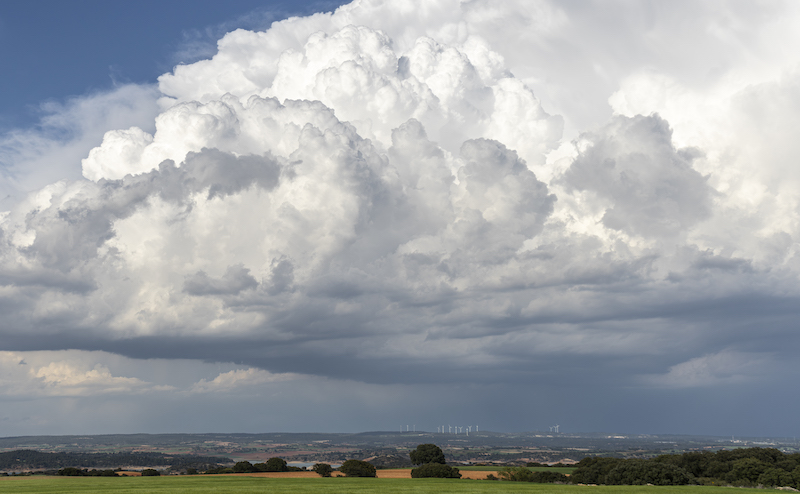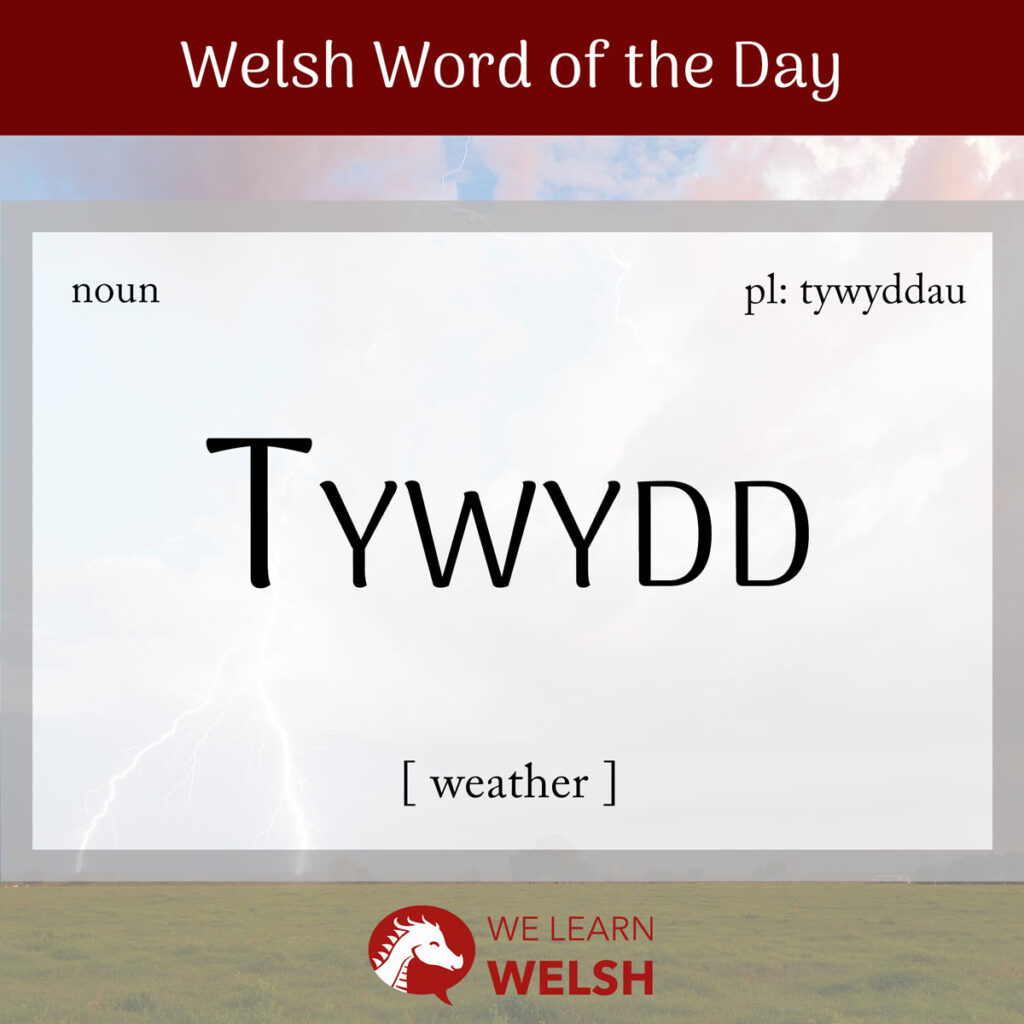If there’s one thing that’s enwog (famous) about Cymru (Wales), it’s got to be y tywydd gwael (the bad weather)! As you can see from that phrase, the Welsh word for weather is tywydd.
The concept of weather is generally considered uncountable, so it’s not normal to need to use a plural for it. However, if you do want to be able to pluralise it for any reason, a safe bet is the standard Welsh plural form of suffixing –au, creating tywyddau. The English phrase in all weathers doesn’t use a plural form in Welsh – it becomes ym mhob tywydd (in each kind of weather).
tywydd
weather
Since this word is so similar to the Cornish tewedha, it’s probable that it comes from a proto-Brittonic root.
Interestingly, the default words for weather in Breton, Irish Gaelic, and Scots Gaelic are all much more similar to amser (time). This is likely due to Latin influence, as in many Latin-based languages there’s a bit of overlap between the concepts of time and weather – or the same word may even be used to describe both, like tempo in Italian.
Since tywydd begins with the letter t, it is susceptible to all three kinds of Welsh mutation.
Soft mutation
dywydd
Nasal mutation
nhywydd
Aspirate mutation
thywydd
Remember, though, that the aspirate mutation actually gets dropped fairly often in colloquial Welsh, or sometimes replaced with the soft mutation. Of the three letters that respond to the aspirate mutation (c, p, and t), t is generally the letter for which speakers are most likely to neglect the correct mutation.
This is particularly common after a (and). So, although you might expect the phrase grey skies and stormy weather to be translated as cymylau llwyd a thywydd stormus, many native speakers will just stick to cymylau llwyd a tywydd stormus.
In general, tywydd is considered a masculine noun. Among other things this means it doesn’t soft mutate after the definite article y (the) and it doesn’t cause a soft mutation to adjectives that follow it.
Rydyn ni’n aros gartref heddiw, oherwydd y tywydd gwael.
We’re staying at home today, because of the bad weather.

To make things more confusing, many speakers in North Wales actually do treat it as feminine, reversing both of these rules! So while y tywydd teg (the fair weather) is standard, y dywydd deg can be heard in parts of the North.
I wonder if this might be partly down to the older word hin. Nowadays, hin only shows up in literature or in set phrases, but it used to be a common alternative to tywydd, and it’s considered a feminine noun.
To ask about the weather, you can simply say sut mae’r tywydd (how is the weather?) If you want to get fancy, you can add tu allan (outside) to the end of the phrase.
The most usual way to describe good weather is tywydd braf (fine / sunny weather), which is common all over Wales. In the South, you might also hear tywydd ffein (fine weather), and of course tywydd da (good weather) and tywydd gwych (great weather) will be widely understood too. I mentioned tywydd teg above – this is less common but still a good option.
For bad weather, it’s fine just to stick to the simple tywydd gwael, but you can make your speech more idiomatic by incorporating phrases like tywydd mawr (bad, stormy weather, literally big weather) or tywydd garw (rough weather). In the North, tywydd budr (dirty weather) is a fun option, or camdywydd (crooked weather) in the South.
If you want to get more specific, you can say:
- mae hi’n heulog = it’s sunny
- mae hi’n gynnes = it’s warm
- mae hi’n boeth = it’s hot
- mae hi’n oer = it’s cold
- mae hi’n gymylog = it’s cloudy
- mae hi’n wyntog = it’s windy
- mae hi’n bwrw glaw = it’s raining
- mae hi’n bwrw eira = it’s snowing
Welsh has no gender-neutral object pronoun, so when we’re talking about objects, we have to choose whether they will be referred to as hi (she) or o / e (he). Most of the time, it’s the latter, but confusingly, it’s the former when we’re describing the weather… despite the fact that tywydd is a masculine noun!
Dim ond os bydd y tywydd yn newid.
Only if there’s a break in the weather.
We don’t really use weather as a verb in Welsh. While a weathered landscape or rock can be described as hindreuliedig, deriving from the older term hin we discussed earlier, translations for to weather something as in to endure it will depend on the context.
Dod drwyddi / dod drosti (to come through it / to come over it) are probably the most common choices. But if you are literally talking about weathering bad weather, an appropriate expression would be dal tywydd (holding weather).
In very casual conversation, you might also hear weddro, which is a direct borrowing from the English. And a more literal translation of endure would be parhau (to last) or goroesi (to survive).
Dylen ni hefyd ystyried y tywydd.
We should also consider the weather.
There are plenty of idiomatic ways to talk about y tywydd in Welsh, and this is one of the best ways to make your everyday conversations more fun, diverse, and natural. Here are some examples, but if you live in Wales yourself, why don’t you let us know which ones are most common in your area?
- glaw tinwyn Abertawe = cold, heavy rain lasting all day (literally Swansea’s white-tailed rain)
- pyst o dan yr haul = sunbeams (literally posts under the sun)
- mae hi’n pluo eira = it’s snowing lightly (literally it’s feathering snow)
- mae hi’n ddigon oer i rewi brain = it’s extremely cold (literally it’s cold enough to freeze crows)
- mae hi’n casglu tywydd = it’s threatening rain (literally it’s collecting weather)
- mae storm yn magu = a storm is coming (literally a storm is breeding)
- mae’n bwrw hen wragedd a ffyn =(it’s raining cats and dogs, literally it’s raining old women and sticks)
- fel hwrdd mewn niwl = confused (literally like a ram in fog)
- fel gafr ar daranau = excited (literally like a goat in a thunderstorm)
For those who live in Wales, checking rhagolygon y tywydd (the weather forecast) is an essential step in every morning routine.
But you have to make sure you make the most of enjoying the beautiful natur (nature) and golygfeydd (landscapes) whenever you can, er gwaetha’r tywydd (no matter how bad the weather is). After all, there’s nothing a good côt law (raincoat) and some wellies won’t fix!

